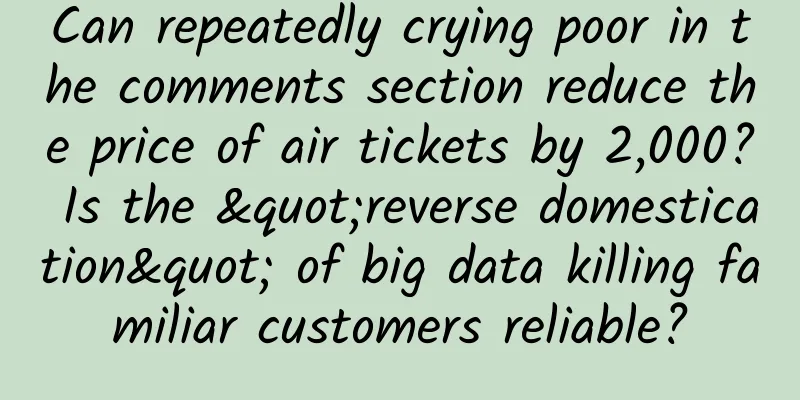Can repeatedly crying poor in the comments section reduce the price of air tickets by 2,000? Is the "reverse domestication" of big data killing familiar customers reliable?

|
Recently, according to media reports, some netizens reduced the price of air tickets by repeatedly commenting that "air tickets are too expensive", thus triggering heated discussions on the topic of "reverse domestication of 'big data killing the familiar'". The practice of netizens "crying poor" in the comment section to reverse the taming of algorithms reflects consumers' uneasiness and resistance to algorithms, but is this approach really effective? How can the problem of "big data killing old customers" be fundamentally solved? Does “crying poor” really work? According to media reports, a young man repeatedly commented that "the air ticket is too expensive, I can't afford it, and I won't go", and found that the air ticket price dropped from 4,309 yuan to 1,903 yuan, a price reduction of more than 2,000 yuan. However, official customer service of several travel platforms told reporters that air ticket prices change in real time and are affected by many factors. Even if this consumer made repeated comments, it cannot be proved that the final price reduction was determined by the content of the user's comments. ▲Screenshot of The Paper video In addition to the price reduction "strategies" of travel platforms, the reporter also saw many "strategies" for takeout red envelopes on social platforms. Under these posts, there are comments such as "XXX software, I want to uninstall you", "I'm really angry", "I'll never use it again", etc., and it is said that if the software is uninstalled and downloaded again after a few days, more red envelopes will be obtained. Can these means really influence the "personality" set by the platform for consumers? In this regard, many food delivery platforms have not responded clearly. The customer service of a platform said that the platform's distribution of red envelopes is a routine operation to acquire customers and will not attach so-called "labels" to consumers. Some consumers also complained that different phones showed different prices. "I ordered takeout using two phones, and the price was several yuan different. When I logged out and logged in again, the price was several yuan higher. Online shopping is also based on big data. Different accounts have different prices." The customer service of the above-mentioned food delivery platform stated that the so-called price difference is usually caused by coupons or promotions. If the same product has different selling prices, you can complain to the platform. CCTV News recently interviewed Lv Yanhui, a member of the Computer Security Committee of the China Computer Society, on this topic. He said that the so-called big data price discrimination refers to operators setting different prices for the same products based on factors such as the user's age, occupation, and consumption level. "This requires companies to pay attention to the compliance and security of algorithm use while pursuing technological innovation and business development, so as to prevent damage to user interests and violation of laws and regulations." The more views, the higher the price? Have you noticed that some of the products you often look at are becoming more and more expensive? This is not nonsense. Research has found that some businesses use big data analysis to increase prices for users who browse or purchase frequently. ▲Comparison screenshots of a shopping website Some consumers have reported that after browsing a product multiple times on a shopping platform, they found that the price had increased compared to the first time they browsed. The reason for this is closely related to the application of big data technology. Shopping platforms collect data such as users' purchase records, browsing histories, search keywords, etc., to build user portraits and divide users into different groups, such as high-value users, potential users, and lost users. They also analyze users' shopping preferences, behavioral habits, and purchasing power, and then adjust product prices. For users who browse and purchase frequently, the platform may use this data to conduct targeted marketing, including price adjustments. For example, provide different types of discounts for high-value users, potential users, and lost users, such as VIP services, exclusive discounts, discounts for new and old users, etc. Although the platform makes consumers believe that they have many choices and offers, in reality their choices may have been limited by the platform's algorithms. According to official surveys, when consumers encounter big data differentiated marketing, there are many common manifestations, and "automatic price increase after multiple views" ranks first. Among them, shopping, food delivery and taxi-hailing are the three categories that are most affected by big data differentiated marketing. In fact, in addition to these three categories, the phenomenon of "same product, different price" will also occur when using apps to book hotels, performance tickets, air tickets, and purchase paid memberships. Some consumers have said that when booking a hotel room through an app, they found that the more times the page was viewed, the higher the price of the relevant hotel would automatically increase, creating the illusion that the hotel was in great demand. After clearing the browsing history, you can even find that the originally displayed prices have been reduced a lot. Other consumers disclosed that when booking a flight through an app, the more you browse, or cancel after booking, the higher the price will be. During the entire booking process, the app page will constantly remind you that "X guests have recently browsed this flight", which makes people mistakenly believe that the later they act, the more expensive it will be, and they rush to place an order, but when they look at the ticket again the next day, it has returned to its original low price. Unexpectedly, multiple browsing would become a “reason for being ripped off”, which made consumers feel very hurt. How to deal with the “killing of old customers” by big data? Although the country has introduced many laws to protect the rights of consumers, supervision is difficult due to the concealment and complexity of big data "killing old customers" behavior. In order to maximize profits, some companies continue to try new technical means to circumvent regulation. For example, use artificial intelligence and machine learning technologies to deeply mine and analyze user data to achieve more refined differentiated pricing. Due to the complex nature of big data "killing old customers" itself, it is difficult for consumers to provide evidence, and there is a lack of systematic regulatory laws and regulations, so it is not easy to rectify this phenomenon. We should improve the laws and regulations related to algorithms as soon as possible, improve the transparency of algorithms, and avoid the risks that algorithms may bring. We should introduce special laws and regulations to regulate the behavior of "killing the familiar" with big data. Consumer associations also need to follow up on new issues in consumer rights protection in a timely manner and introduce new rules for consumer rights protection targeting algorithms to increase regulatory intensity and strengthen institutional constraints. To solve this problem, it is necessary to supervise the platforms well. More effective supervision and restraint measures should be taken to urge the platforms to fulfill their responsibilities. Relevant departments should take the initiative to carry out relevant law enforcement and investigation through special inspections and other means. Consumers should strengthen their awareness of protecting their personal data information, such as deleting browsing history in a timely manner after browsing the web to prevent data information from being used unreasonably; when choosing goods and services, try to compare prices from different stores and understand the prices of goods and services on different platforms to prevent being "taken advantage of" by big data. Source: CCTV News, Voice of China, China Consumer News, People's Daily Science |
>>: What! Soba noodles are unhealthy? The truth is...
Recommend
Advanced Software Test-System Architect Elite Class 2022 5th
Course Catalog: ├──1–Understanding and cognition ...
User growth: creating a closed loop for attracting new users
The endless stream of products on the market has ...
Cold knowledge | The way to get rid of pain is to live well
One minute with the doctor, the postures are cons...
3 things you don’t know about getting featured in the App Store
In some reports on overseas games, we often find ...
Tencent invested in Toutiao? Here are three questions
Reliable we-media outlet Kaiba broke the news tha...
Xiaomi App Store 2016 first half report!
Xiaomi App Store 2016 first half report! The oper...
British police need training for fighting swans? This is no joke
Recently, a British police station announced that...
Without tens of millions of users, how can the value of To B operations be reflected?
Compared with To C operations , To B operations a...
Brand advertising strategy and planning!
Last Wednesday, when Apple announced its new prod...
5G base stations have been opened in six cities, which are 20 times faster than 4G!
China Telecom took the lead in announcing that it...
Only 3 scientists in the world! Chinese scientists won this international award
Recently, at the Eurokarst2022 conference at the ...
Apple releases iOS 11.4 beta 2 with more than just ClassKit
Recently, Apple released iOS 11.4 beta 2. Two wee...
Android Mirror App A programmable mirror
Let’s first take a look at the mirror in my home ...
How do we media people make money? What are the profit models of self-media?
Wow, one day’s income from self-media is equivale...
With sales plummeting, has Xiaomi’s Internet model come to an end?
In the smartphone industry or the Internet techno...









